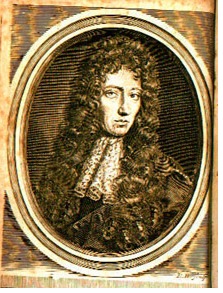 Robert Boyle's family belonged to the English governing class of Ireland and was wealthy enough to send Robert, the 14th child, to Eton College, followed by five years of travel with a tutor through Europe.
Robert Boyle's family belonged to the English governing class of Ireland and was wealthy enough to send Robert, the 14th child, to Eton College, followed by five years of travel with a tutor through Europe.Anglo-Irish chemist and philosopher, b. 25 January 1627 (Lizmore, Ireland), d. 30 December 1691 (London, England).
 Robert Boyle's family belonged to the English governing class of Ireland and was wealthy enough to send Robert, the 14th child, to Eton College, followed by five years of travel with a tutor through Europe.
Robert Boyle's family belonged to the English governing class of Ireland and was wealthy enough to send Robert, the 14th child, to Eton College, followed by five years of travel with a tutor through Europe.
The young Boyle was interested in science and philosophy. He wrote moral essays, which did not carry much further than the ideas of any idle member of the ruling class, but then began experimenting. As obtaining laboratory instruments was impossible in rural Ireland he left his estate for Oxford, where he lived from 1656 until 1668.
The physicist Robert Hooke helped Boyle with the construction of an air pump, and Boyle began a series of experiments in which he demonstrated the role of air in various chemical, biological and physical processes such as combustion, respiration and sound propagation.
Boyle's major discovery was the relationship between pressure and the volume of gases: At constant temperature the volume V of a gas decreases in proportion to the increase of pressure p to which it is exposed. In mathematical form
V p = constant
Boyle discovered the relationship in 1661 and published it as an appendix to the second edition of his work New Experiments Physio-Mechanicall, Touching the Spring of the Air and its Effects. The same law was discovered independently in 1676 by the French physicist Edme Mariotte, and the law is now known as Boyle-Mariotte's Law.
Boyle's major contribution to science was his work The Sceptical Chemist, in which he rejected the classical Aristotelian idea of earth, air, fire and water as the building blocks of matter as well as the ideas of Paracelsus (who had described salt, sulphur and mercury as the most important ingredients). Boyle introduced the concept of primary particles that come together in aggregates or "corpuscules" to form different substances. He thus laid the foundation for the concept of atoms and molecules.
Boyle's work brought him much fame during his lifetime. He lived the last three years of his life in London, where he was closely involved in the activities of the Royal Society. He had already been elected its president in 1680 but declined to act in that position.
Boyle's Anglo-Irish upper class background remained manifest through his activities to spread the Christian faith in general and Protestantism in particular. He supported charity, financed translations of the New Testament into Irish and Turkish and left an endowment in his will to support regular lectures "for proving the Christian Religion against notorious Infidels." These "Boyle lectures" still continue today.
In his late work The Christian Virtuoso Boyle described the world as a mechanism that was set in motion by a Creator and continues like a clockwork. He allocated to science the role of discovering the laws of the clockwork, which he considered a religious duty.
Portrait: Frontispiece from Some motives and incentives to the love of God, pathetically discours'd of in a letter to a friend, by the Honble Robert Boyle, The fourth edition much corrected, London: printed for Henry Herringman, 1665; University of Cambridge, Whipple Museum Reserve Gallery, Robert Boyle Collection; public domain
Robert Boyle. Encyclopaedia Britannica 15th ed. (1995)